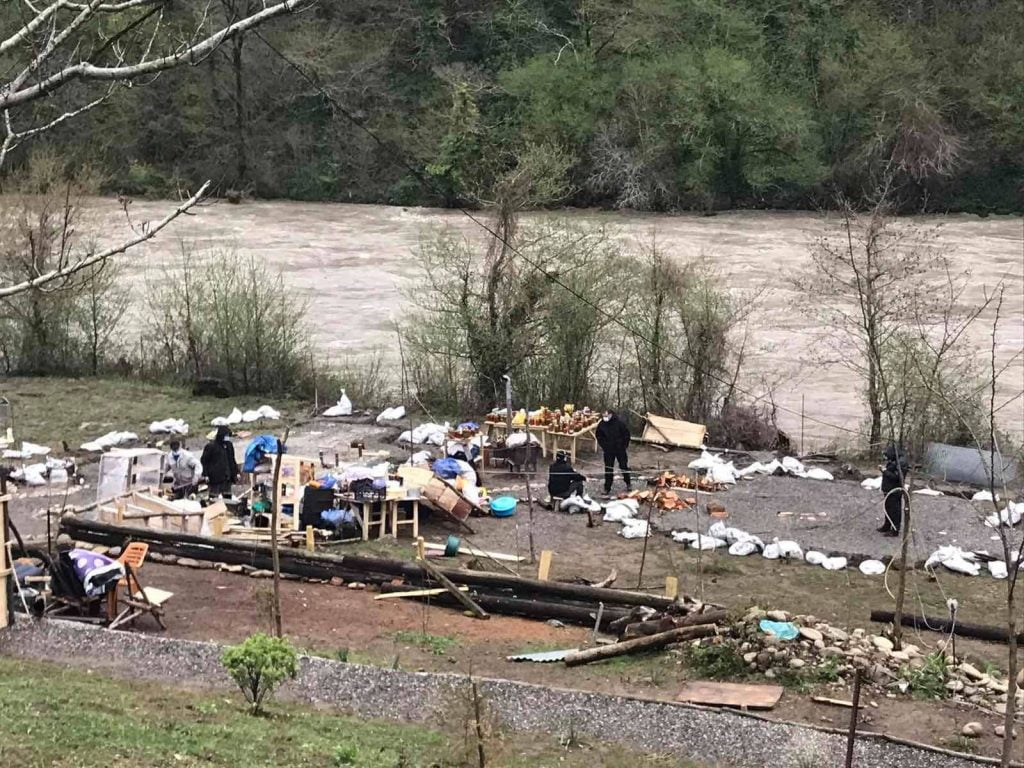In a strongly-worded joint statement of April 12, thirteen Georgian CSOs expressed their solidarity with Gumati-based protesters against the Namakhvani Hydropower Plant, “whose constitutionally-guaranteed rights to assembly and manifestation are gravely violated by the state [authorities].”
The signatories condemned the Government over deploying “repressive mechanisms” against concerned Rioni valley locals, instead of listening to their concerns. This, CSOs said, is a threat to democracy, and against all political and civil society groups irrespective of whether they back the Namakhvani HPP project or not.
Against the backdrop of 168-days-long peaceful protest, the Government keeps increasing “repression” against the Rioni River valley inhabitants daily, the organizations asserted, adding that “in the recent days, the law enforcement bodies are themselves going beyond the law and deliberately, with the use of illegal forceful methods trying to squash the protest.”
Statement by the Open Society Foundation
In a separate starkly-worded missive of April 12, the Open Society Foundation said the authorities failed to substantiate the reasons behind the erection of checkpoints in the direction of Namakhvani and “restriction of freedom of movement for the Georgian citizens on the territory of the country.”
The CSO asserted that the Interior Ministry’s attempted substantiation of dismantling the protest tents in Namakhvani village on April 11 does not meet the basic justification standards required by the Georgian Constitution.
Accusing the authorities of the “forcible attempt to stop the protest and of grave human rights violations,” the Open Society Foundation said the decision about the Namakhvani HPP construction did not take into account concerns over ecology, cultural heritage, project’s social benefits, and the needs of the local population. The scientific arguments regarding the project safety and erroneous studies were not refuted either, leading to the “just protest” of locals, the CSO added.
Background
Tensions are high in the Rioni River valley of western Imereti and Lechkhumi regions after police dismantled the tents where activists protested for over 160 days against the construction of the controversial Namakhvani HPP on April 11. The Interior Ministry cited the flooding alert of the river, among others, behind the decision. Activists disagree with the flooding alert reports, accusing the police of infringing their rights to freedom of expression and assembly, and of attempts to squash their protest.
Denied the opportunity to continue protest in Namakhvani village, near the HPP construction site, the powerplant construction opponents today gathered in the village of Gumati, the southern entry point of the valley, where police erected a checkpoint a week ago and kept restriction access to the valley ever since.
Citing articles 25 and 26 of the Law on Police, which grants the law enforcement body the movement restriction rights, the police said today it will not allow a “violent scenario” of protest in the Rioni valley. The activists repeatedly pledged to remain peaceful, rejecting the Interior Ministry’s hinting over their possible violence.
The Namakhvani project encompasses two separate HPPs of 333 MW and 100 MW on the Rioni River. The government hopes to enhance its energy security and to employ up to 1,600 Georgians with the “foreign direct investment in the amount of USD 800 million.”
The activists, CSOs, and locals against the project, on the other hand, cite the seismic and other natural disaster risks, potential environmental damage, the contractual conditions that allow the investor to confiscate private property and utilize natural resources, and extensive right to seek the government compensation for damages, as some of their key concerns.
- Tensions Mount as Police Dismantle Protest Tents in Namakhvani
- Tensions at Namakhvani HPP Site as Works Resume with Police Backing
- Turkish Ambassador’s Namakhvani HPP Remarks Stir Controversy
This post is also available in: ქართული (Georgian) Русский (Russian)

